Why Forest Hills Bootleg Society can only take place in the early aughts
Forest Hills Bootleg Society co-creators Nicole Goux and Dave Baker talk about anime, the early 2000s, and high school
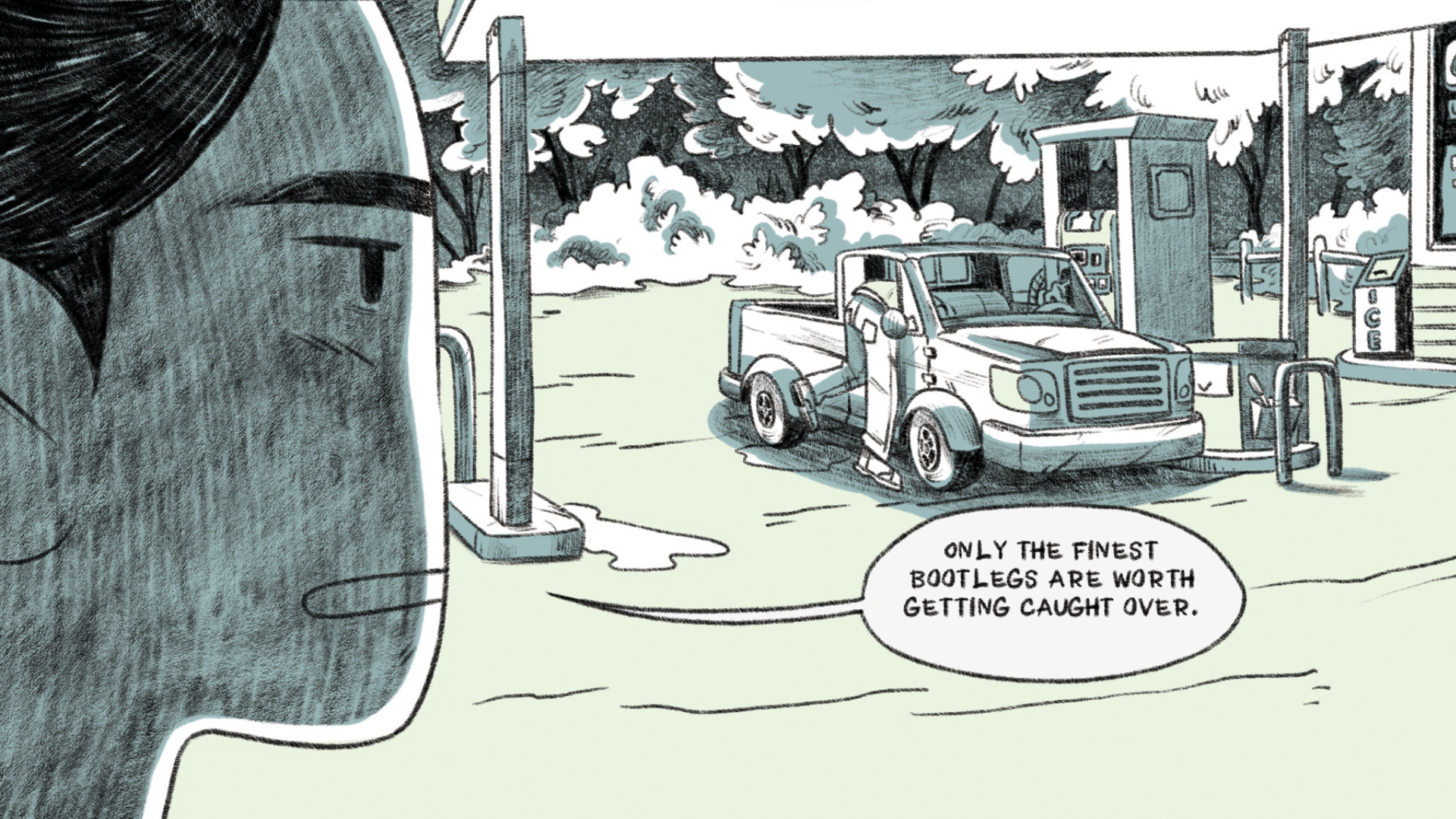
In the new graphic novel Forest Hills Bootleg Society by Dave Baker and Nicole Goux, which is set in 2005, best friends Brooke, Kelly, Maggie, and Melissa just want to watch anime - but when they try to buy bootleg DVDs from someone at a gas station, they get a lot more than they bargained for.
Rather than any of the titles they want to see, the girls put the DVD in a player and discover it's an adult film called Super Love XL that's been mislabeled. Knowing it would scandalize anyone in their small, sleepy town - especially at the super conservative Christian school most of them attend - the girls make a plan to sell copies to local boys for $20 each, with the goal of getting cool, matching jackets so they can have more social clout.
Although the plan goes right at first, it quickly starts to disintegrate just like the girls' actual relationships with each other.
In conjunction with the book's release, Newsarama spoke with Forest Hills Bootleg Society co-creators Baker and Goux via e-mail about anime, the early aughts, high school, and more.
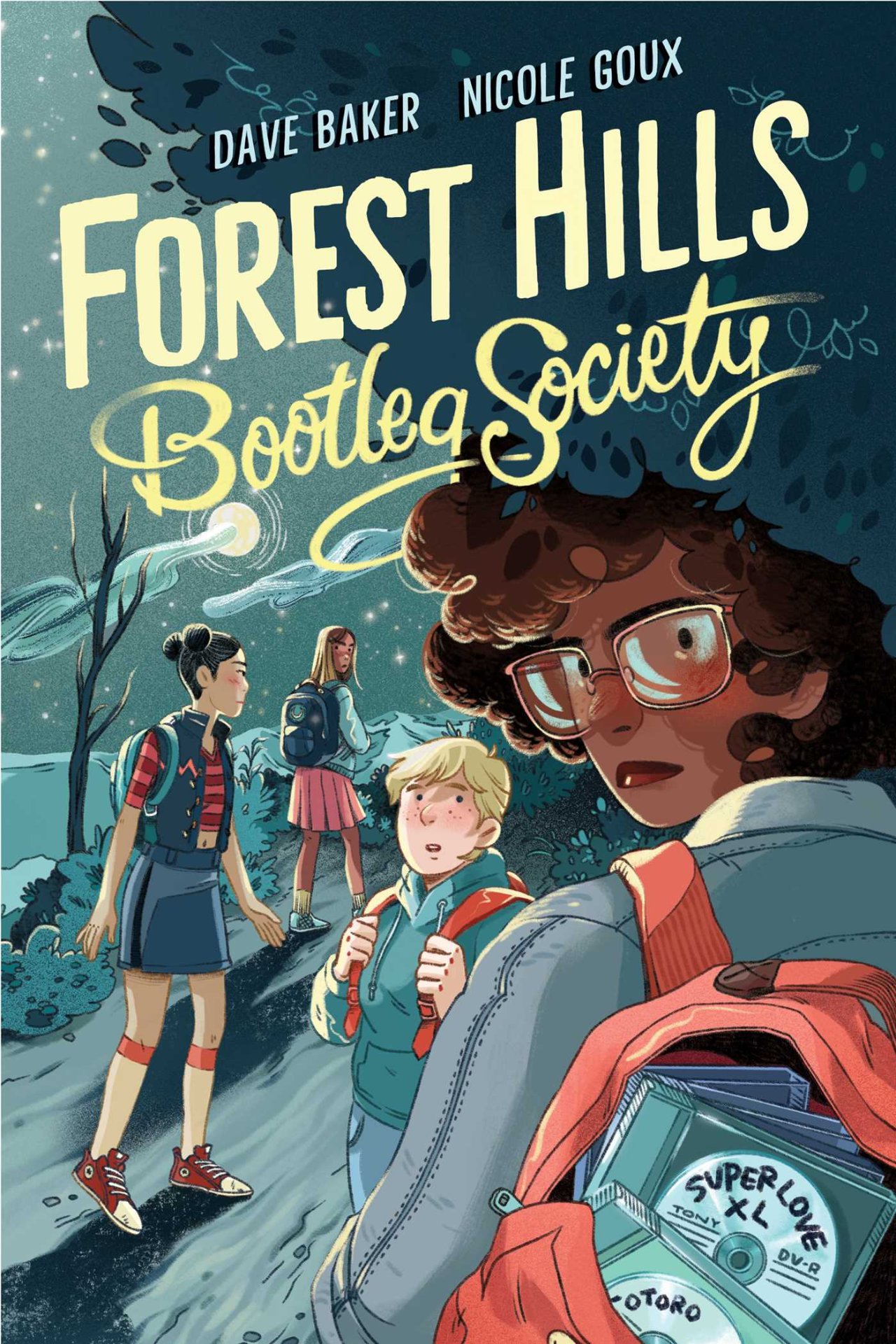
Samantha Puc for Newsarama: Nicole, Davie, what inspired Forest Hills Bootleg Society?
Nicole Goux: I love telling stories about high school and growing up, and when I do, I draw on lived experience and the stories of people around me. I was a big anime kid as a teen and it was something that set me apart and made me just a little bit 'weird.' I think if you're into anime you get it, and if you don’t… it's something that can feel impenetrable to the outside eye.
That experience, I think, is a good synecdoche for anything that sets you as an outsider growing up. So within this framework, we wanted to tell a story about how it feels to live in a world that doesn't understand you and how hard it can be to find your way when everyone around you tells you you're doing it wrong. That, and it's just fun to tell stories about anime-obsessed high schoolers.
Get the best comic news, insights, opinions, analysis and more!
Dave Baker: Yeah, and I used to buy bootleg DVDs from friends in high school and it always seemed like a really funny criminal enterprise to me. Like, 'What if I had gone to prison for buying Final Fantasy: Advent Children?' It just seemed like a funny setup for a book.
Nrama: Why 2005?
Goux: First, since this is drawn from our passions and interests as teens, it felt right to tell the story in a time when we actually were teens. Also, the entire mechanism for the story, selling and distributing burned anime DVDs, really only lives in that very narrow window of time. Post-VHS, pre-web pirating, it was a glorious time when you took what you could get and then shared it with everyone you knew because we were all starved for the content we craved so much.
Baker: There's also something that felt so politically oppressive about the early 2000s when we were coming up with the book. The rising tide of Neo-Conservatism, the puppet president, the prevalence of terror attacks… it all just seemed to heighten the drama of our story.
There's a lot of nostalgia for the early 2000s happening right now, which is just so exceedingly bizarre to me. I lived through it. And boy, it was a scary time. So, I wanted to play around with that narrative friction. The IDEA of the 2000s vs the more in-your-face elements of it.
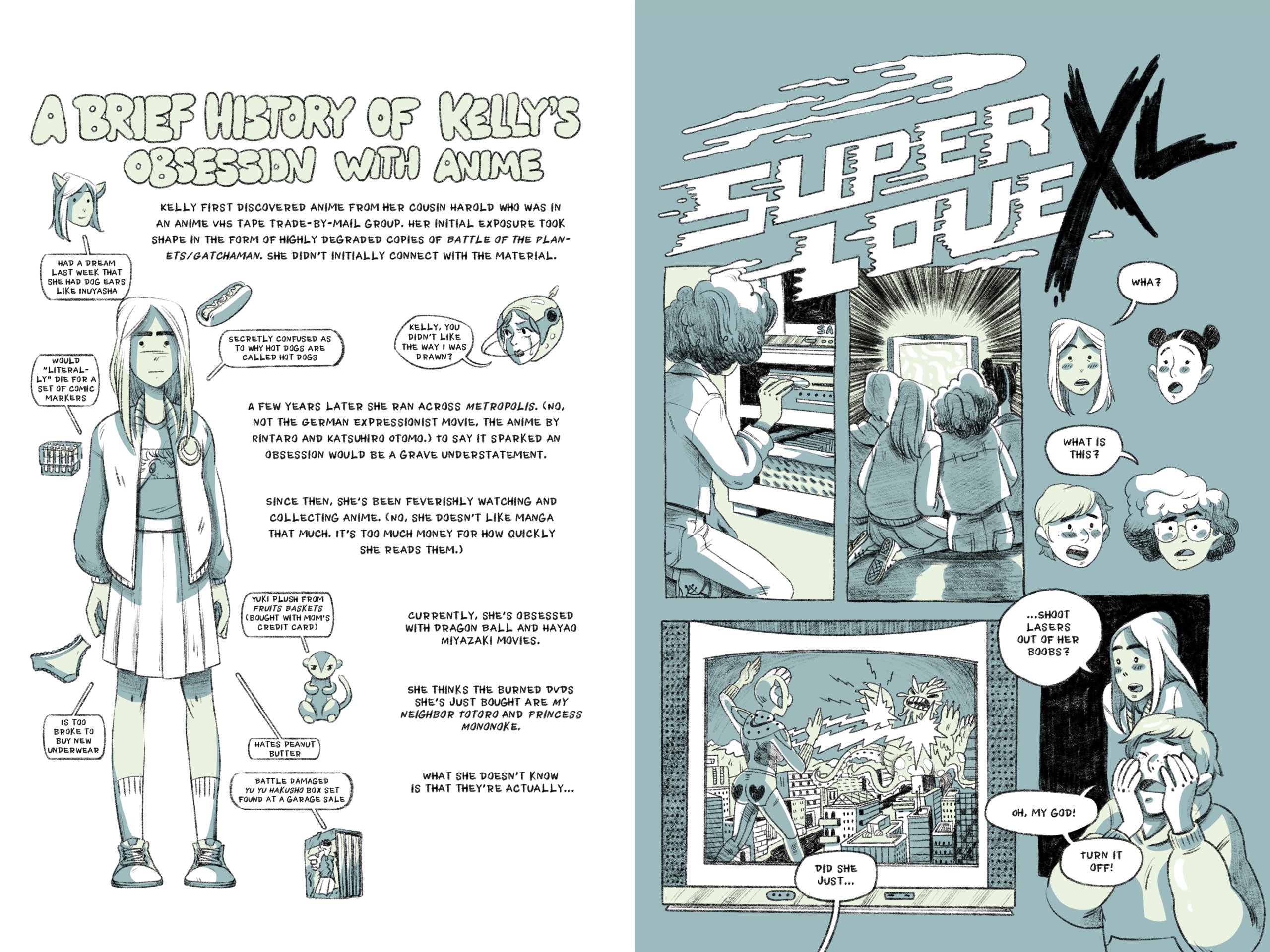
Nrama: How has the story changed since you initially conceived of it?
Goux: Every book we make changes in the making of it. There is so much discovery in the process of writing, honing, creating a story that I'm honestly pressed to believe anyone who says they've written a book that's exactly what they set out to make. But I think this is actually a good thing. I think the original pitch for this idea was both more extreme and less extreme than the end product and it's definitely better for the time and care we put into making this story what it is today.
Baker: I think when we first started working on it the idea is it would be more a low-stakes crime book set in a high school. But it really turned into a dramedy about growing up where the reason our characters hang out is burning DVDs and talking about anime. Which, frankly, wasn’t that far from my actual high school experience.
I think the book ended up being more interpersonally sad than we initially thought it would. Which, y'know, that feels right when you look at our body of work. Sometimes I wonder what would happen if we tried to make an outright comedy… and then I go… 'But is it really one of our books if no one cries while shoving food in their face?'
Nrama: These characters go through brutal changes, individually and as a group - without giving away too much, can you speak to those journeys and how you went about developing them?
Baker: I think for a lot of people high school is a pressure cooker that defines a lot of the rest of your life. It's a place that feels weirdly transient while you're there but the experiences you have there mold you in these ways that you're not really aware of until decades later.
The scars you come out of high school with are what most people codify you with for the rest of your life. And that’s absolutely something we wanted to explore, evaluate, and deconstruct while making Forest Hills. Fuck Off Squad, our previous book, was about navigating the gap between begin a kid and an adult. And I think Forest Hills is much more about how the specter of adulthood can make kids do things that they THINK will set themselves up to mature into an adult, but in actuality permanently warp them.
Nrama: As creators, how did you feel when you 'ripped the mask off' of these characters, their actions, and even their town?
Baker: When Nicole and I build characters we approach them as if they were our friends. Over the course of making these books the characters become very real to us. And as such, sometimes it can be hard to put them into uncomfortable or mean-spirited situations to expose who they really are underneath.
However, that's pretty expressly our responsibility as storytellers. We both want to make narratives that are honest. And sometimes the only way to get at the truth is to truly push your characters to extremes.
Nrama: Why did it feel important to play with the tension between faith, sexuality, and legality within the context of a teenage friend group?
Goux: Dave and I are interested in telling stories about the real trials and difficulties that we grapple with in the process of growing up and discovering ourselves. These themes are realities that almost everyone buts up against at some point in their lives.
I think there's a place for light and fun stories, but kids (and adults) want stories about the hard things that happen. They want to see themselves in stories, have something to relate to, and feel that they're not alone. I want to connect to my readers through the shared experiences. If even one kid feels seen because of our books, I'll be happy.
Baker: Without getting too personal, I'll just say there's a quote: "All writing is biographical." And leave it at that.
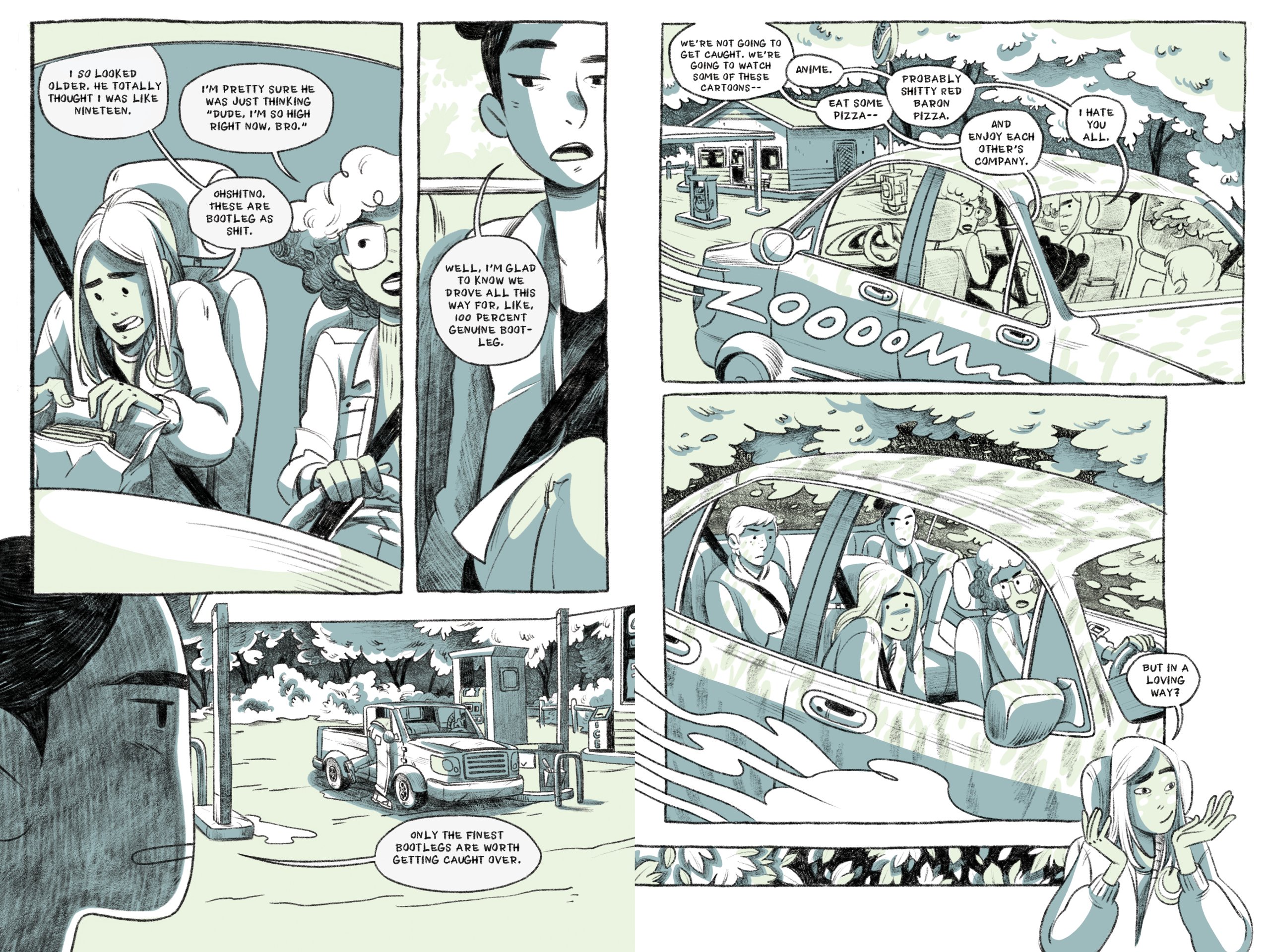
Nrama: How does the minimal color palette inform the storytelling?
Goux: I think the limited palette affects the story in a few ways. Surface level, it makes it feel more 'of a time.' Our story is a period piece, and the limited colors work in a similar way to putting something in sepia tone. It's a cue to the reader that 'this isn’t now.'
It also sets a tone for the book, a feel. You can’t underestimate the impact color has in our understanding of a story. If this book was all neon colors, or all bright primaries, or all reds, each one of those versions would be giving different cues to the reader about how they're supposed to feel when reading it. Simply, the blues and greens are sad and moody, so you know that maybe this isn't going to be the fun romp you thought it was as soon as you open up the book.
Nrama: What are your favorite anime titles?
Goux: Modern-day me picks the 'classy' titles like Howl’s Moving Castle, Millennium Actress, and Cowboy Bebop. But high school me? High school me loved high romance dramas like Fruits Basket, Fushigi Yuugi, Rurouni Kenshin… Actually, who am I kidding? I still love those!
Baker: I’m a big Akira fan. I’m obsessed with both the anime and the manga. I also love the two Patlabor feature films. I’m a big Shotaro Ishinomori fan. I love Kamen Rider, Kikaida, and Super Sentai. I’m also a big fan of Cyborg 009. Also can’t forget my guy Satoshi Kon. Perfect Blue forever. Oh, and Summer Wars is another favorite as well.
Nrama: What do you hope readers take away from Forest Hills Bootleg Society?
Goux: That growing up is hard, we all feel like outsiders, and you are not alone. Also, anime is pretty cool.
Baker: Exactly. What Nicole said.
Nrama: Is there anything else you'd like to add?
Goux: Dave and I have spent roughly six years working on this book. We put our heart and soul into it. The characters on these pages feel like close friends, even family to us. We just hope that readers can feel a connection to them, have empathy and hope for them, and also to have a little fun along the way!
Forest Hills Bootleg Society is available now.
Forest Hills Bootleg Society makes Newsarama's list of 20 graphic novels that can help keep you warm throughout the fall.
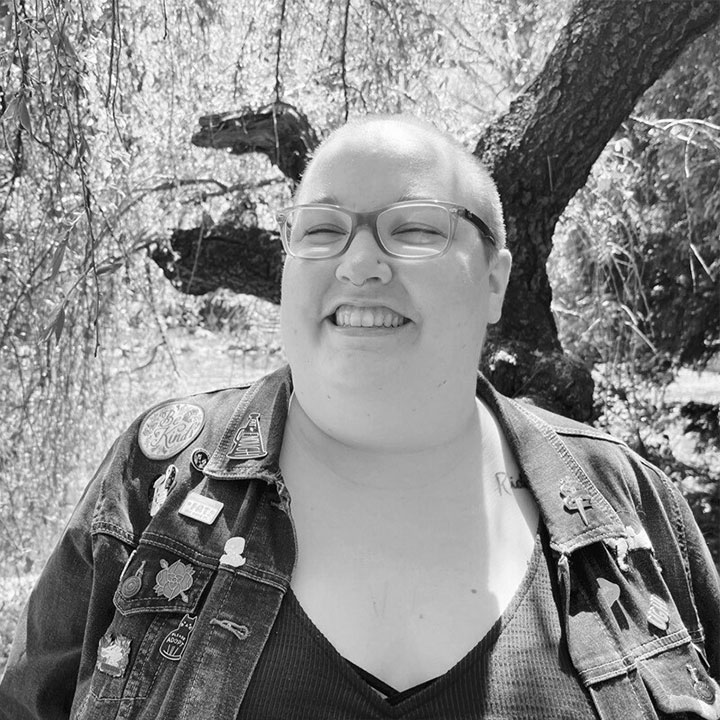
Samantha Puc (she/they) is an editor at Newsarama and an avid comics fan. Their writing has been featured on Refinery29, Bitch Media, them., The Beat, The Mary Sue, and elsewhere. She is currently pursuing a Master of Fine Arts degree in creative nonfiction at The New School.


